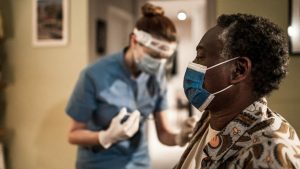N.J. Stop-gap Licensing Waivers Offer Promise For Nurse Staffing Crisis
 At the height of COVD-19’s first wave, temporary licensing waivers allowed nursing homes to hire desperately needed help from out of state.
At the height of COVD-19’s first wave, temporary licensing waivers allowed nursing homes to hire desperately needed help from out of state.
Keeping those relaxed regulations or building in flexibility permanently could be key ways to address the nation’s ongoing nurse staffing crisis and improve patient access to care, suggests a study and several related commentaries published in Health Affairs Monday.
Researchers from Rutgers University and the Office of the New Jersey Attorney General examined changes in New Jersey law that allowed healthcare providers from every other state to work in-person and via telehealth in inpatient and outpatient settings during the pandemic. New Jersey ultimately became one of 45 states to enact some type of licensure waiver during COVID. It was among the first because it had early outbreaks.
“From a public health perspective, it was imperative for states such as New Jersey to increase service capacity by setting up a temporary emergency reciprocity licensure program to remove administrative barriers for supplemental healthcare providers,” wrote lead author Ann M. Nguyen, an assistant research professor at Rutgers and Implementation Scientist at the Center for State Health Policy. “This unplanned experiment demonstrates the importance of regulatory flexibility enabling rapid response in an emergency.”
Nguyen and her team surveyed more than 10,000 temporary license holders — about one-third of the total given waivers — to understand how and where they used their New Jersey permissions. They found the increased workforce supply particularly bolstered hospital and other inpatient care, including for Medicare and Medicaid beneficiaries such as those in nursing homes.
As of January 2021 the Division of Consumer Affairs had issued about 27% of the temporary licenses to physicians, 26% to mental health providers, 35% to nurses and nurse practitioners, and 2% to respiratory care therapists.
Although the waiver program was designed as part of the COVID-19 response, it also expanded access to non-COVID care at a time when certain sectors were hemorrhaging long-term employees and losing workers temporarily due to exposure to the virus.
Nguyen urged policymakers to further study the costs and benefits of lifting licensing restrictions in non-emergency situations, even as New Jersey and other states have begun to roll back their waivers.
“Across the US, prepandemic healthcare workforce shortages were exacerbated by COVID-19 because of burnout, attrition and early retirement. A recent report suggests that current workforce pipelines will not meet market needs,” she wrote. “Temporary licensure of out-of-state practitioners, along with telehealth waivers, may be a valuable, short-term solution to mitigate healthcare workforce shortages during public health emergencies.”
More flexible licensing for future?
She added that other provisions, such as temporary emergency graduate licensure, retiree license reactivation, interstate licensure compacts, and federally deployed providers such as the National Guard, also could be worth examining for their potential to help the healthcare workforce supply.
In an accompanying commentary, physicians Brendan G. Carr and Nicholas Gavin of the Icahn School of Medicine at Mount Sinai in New York, said it is essential that licensing solutions allow for flexibility to meet evolving needs.
“The pandemic has emphasized the need to create a new system and not just iterate the old,” they wrote. “As healthcare delivery evolves and becomes more technology enabled, consumer centric, and ready to respond to both staffing and public health crises, it is essential that the work of creating cross-state efficiencies continue. Practitioners and health systems may want licenses to be completely transferrable; states may want to maintain control of local priorities, revenue, and oversight; and the public will require that the nation find the middle ground.”
Bianca Frogner, PhD, adjunct professor of health systems and population health at the University of Washington-Seattle, added that reducing licensing obstacles could reduce burdens on overtaxed healthcare workers.
“Although the intent of these state-defined parameters is to protect patients from harm, an increasing body of literature suggests that these barriers may decrease people’s access to care,’ she wrote in her own commentary. “The US also needs to consider the effect of these regulations on healthcare workers, who are already reporting high levels of burnout and stress…. Allowing healthcare workers to move freely and provide care across state borders … is the right strategy to address workforce shortages beyond the pandemic.”
(This story originally appeared in McKnights.com.)




